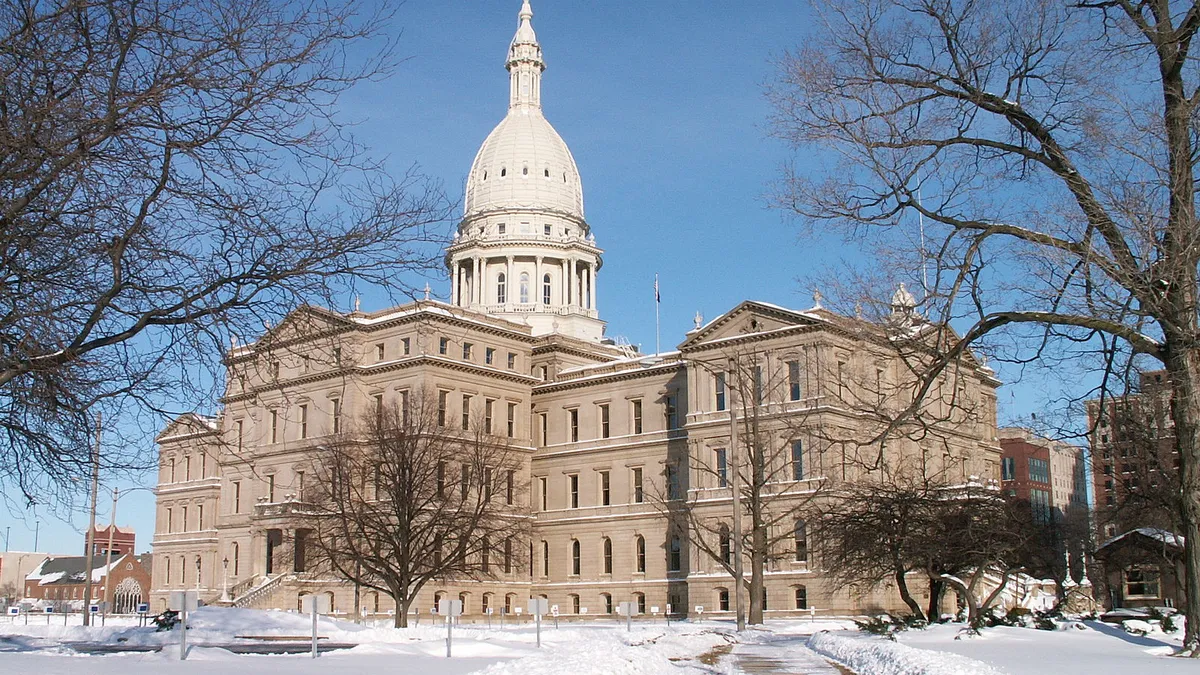Dive Brief:
- A bipartisan group of Michigan lawmakers on Tuesday introduced legislation to help grow the renewable energy market and remove barriers to solar generation established by a 2016 rewrite of state energy laws.
- A package of bills dubbed "Powering Michigan Forward" would remove the cap on distributed generation throughout the state, direct the establishment of a fair value for solar, and push the state to a system based on monthly netting of renewable energy.
- Clean energy and business interests are supporting the legislation, but one of Michigan's largest utilities has pushed back. Consumers Energy says the state set a path forward in the 2016 law, while the new legislation would enact subsidies for privately-owned solar.
Dive Insight:
Lawmakers want to roll back portions of the 2016 law, eliminating caps on distributed solar and utilizing a monthly netting system to assess a solar customer's grid use. The state's utilities, however, are pushing back.
"Consumers Energy opposes the proposed legislation because all customers should pay their fair share to ensure reliability and affordability of the energy grid," the utility said in an email. The bipartisan 2016 energy law "set a clear path forward for customers," and Consumers says the new proposed law would shift costs to non-solar customers.
DTE Energy expressed skepticism regarding the bills. "With renewable energy, scale matters," the utility said in an email to Utility Dive.
DTE touted its universal wind and solar energy projects, adding that it has reduced carbon emissions by 25% and plans to reduce emissions another 10% by 2022.
"Small power sources may have benefits for certain customers, or under certain conditions, but they continue to be expensive and have incremental benefits when you consider the broader issues," the utility said. "We hope the legislative sponsors take these points into consideration when looking at policy solutions designed to support more accelerated transitions to renewable energy."
The 2016 law did increase uncertainty for solar developers by utilizing locational marginal energy prices that made payback rates unclear for some projects. And the law capped net metering at 1% of a utility's peak demand.
Peninsula Solar founder Ian Olmsted said the state's solar cap "hurts our business and employees, and these bills will help support our customers who want to invest in solar – from small residential projects to large scale commercial investments.”
The 2016 law tasked the Michigan Public Service Commission with overhauling the state's net metering system. Regulators made the process more complex by keeping the cap and adopting an avoided-cost tariff based on set remuneration prices in 2018.
"This package of bills is all about fairness, clarity and transparency for individual ratepayers and businesses powered by solar," Rep. Yousef Rabhi, D, said in a statement. "The new distributed generation tariff — a result of the 2016 energy law rewrite — has created needless challenges and roadblocks for the solar industry."
The proposed legislation would "ensure fair value and give ratepayers proper compensation for the energy they contribute to the grid," Rabhi said.
The Michigan Energy Innovation Business Council (EIBC) supports the new legislation, saying the 2016 law and implementation of DTE Energy's distributed generation program tariff made it difficult for solar customers to determine how much they would save on their bills and to determine payback periods.
“These bills are a powerful step to get Michigan moving back in a direction toward a 21st-century grid that fairly accommodates two-way flows of electricity," Michigan EIBC President Laura Sherman said.
The Michigan League of Conservation Voters called the bills "common sense legislation that will remove unnecessary roadblocks for solar customers."
Solar developers also supported the proposed bills. Michigan's largest residential solar provider, POWERHOME Solar, said it would bring jobs into the state. "These bills will help remove barriers for Michigan small businesses and customers interested in clean, renewable energy," company CEO Jayson Waller said in a statement.
Consumers, however, says the legislation is unnecessary. The utility "has one of the boldest plans in the nation to invest in renewable energy," an official told Utility Dive. That includes plans to invest in over 6,000 MW of new solar, the company said.
The proposed legislation "would move the state backwards by providing subsidies for private solar," Consumers said.














